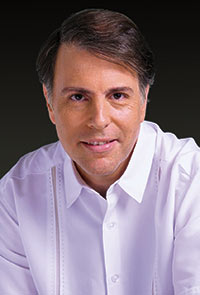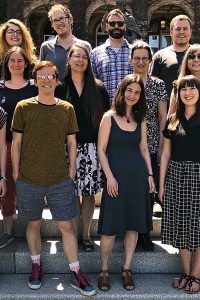Spotlight on: Kelly Abbott, Great Jones Street
 Kelly Abbott is CEO and co-founder of Great Jones Street. He’s helped launch and grow social media, dating, and publishing products purchased by Match.com, Adobe, and Oprah. Now his mission is to meld his literary roots and tech chops to transform the world of short fiction for readers and authors alike. He plays soccer, roots for Cleveland, and lives in San Diego by the ocean with his wife, his son, and his dog.
Kelly Abbott is CEO and co-founder of Great Jones Street. He’s helped launch and grow social media, dating, and publishing products purchased by Match.com, Adobe, and Oprah. Now his mission is to meld his literary roots and tech chops to transform the world of short fiction for readers and authors alike. He plays soccer, roots for Cleveland, and lives in San Diego by the ocean with his wife, his son, and his dog.
Tell us about your short story app, Great Jones Street. What is it, who founded it, and when did it launch?Great Jones Street is the Netflix of Fiction. We mean that seriously, as both a business model and a battle cry. We feature short fiction. We curate. We package it nicely into a great user experience. We will also bring in serials in 2017. People can use our app to discover great fiction from every genre from today’s best working writers and feed their addiction to fiction, as it were. Pay a low monthly fee. All you can eat. Cancel anytime. If you join now, it’s free. We’re doing that for the first 10,000 readers.
The company was founded by me and Ken Truesdale. We’re both guys who’ve had enough non-fiction to last a lifetime. There’s more to fiction than most people realize. I sold a company a few years ago, took some time off, and found I was reading a lot of fiction on my phone. It turns out I was reading a lot of short fiction but spending a lot on collections and anthologies. My dad is a short story writer, so I asked him if he could put me in touch with other story writers. What I discovered astounded me. I had to build the product.
We launched officially this year. But I’ve been talking with writers since that fateful conversation with my dad back in the summer of 2015. We put all of our effort into building the product and acquiring stories in 2016. We’re on track to acquire a thousand stories every year.
Your mission is to ‘‘Bring short fiction back to pop culture.’’ Can you elaborate on that? Why is it important?
So many great writers were going undiscovered because the product for discovering them didn’t exist. The mobile phone changed how we consume movies, TV, and music. Serials, shorts, episodic and auteur-driven media are huge for everyone else right now except books. I love novels. I read them just as enthusiastically as most. But there’s something to being able to drift between stories, genres, voices, and worlds that’s so much better. I love that I have discovered so many great writers in our app, none of whom would have been on my radar were it not for their short fiction. I think the most voracious readers will love Great Jones Street for that. And the way that we package each story makes it more appealing to curious readers.
I have a strong feeling that pop culture promotes what’s promotable, what’s different and odd and exotic without being kitsch or phony. We have some shareworthy writers for sure, great stories that will blow your mind. I want to unlock that potential in readers and writers both.
Why is that important? Because readers are waiting for it. There’s a big shift in our culture away from poor quality and algorithmic consumption. As a result, beer is better. Underwear is better. Television is better. Sex is better. Discerning consumers want more from their publishers. This is a good thing. We’re here to serve that need.
You’ve reached out to editors like John Joseph Adams (for SF/fantasy) and Nick Mamatas (for mystery/crime) to build a quality catalog in various subjects. How many stories do you intend to publish per year, across what range of categories?
We’re leaving no stone unturned. John and Nick helped. We learned a lot from that experience. We were trying to contact writers one by one ourselves. Then John and Nick came along and broke open the flood gates. The experience mirrored what I was experiencing in that writers were eager to join our ‘‘experiment’’ (a term I loathe). There’s a follow-on to their work that makes me proud. I send out these regular notes to our writers, keeping them abreast of what’s happening in the product and at the company. I’m pretty candid in these e-mails. It’s important that writers know that we’re working hard for them. Anyway, in one of my early e-mails, I touted all these great writers we had signed. I was feeling pretty good until I got several e-mails back saying ‘‘what about people of color?’’ and ‘‘what about Japanese sci-fi?’’ and ‘‘what about women?’’ Like anyone I was a little miffed that my effort wasn’t being appreciated, but then I realized what they were saying without saying: ‘‘Can I curate this gap?’’ So now we’re finding really interesting angles on fleshing out our catalog, so much diversity regarding genre, geography, and gender. It is turning out to be the world’s most interesting catalog of fiction.
Your focus is on reprints, but you also publish some original fiction. Tell us about the kind of originals you’re looking for.
Our originals are also referrals from our writers. Honestly, I’m looking for new writers more than established ones when it comes to originals. We have a Fresh Writers series which honestly has some of my favorite stories. These are writers who are maybe in a writing group with one of our writers or are MFA students. Anyway, they’re just starting out in their careers and can get a no-hassle offer from me if they make an impression on one of our writers. It’s so hard for anyone to get a story published, but the first story? I’m really happy when we make that happen.
Is there anything else you’d like our readers to know about you or the work you do?
Share the app. Download it. Send it to your friends. Read a story and post it on Facebook. We have buttons on every screen for sharing. Our success is dependent upon sharing. We can’t be popular without you.





